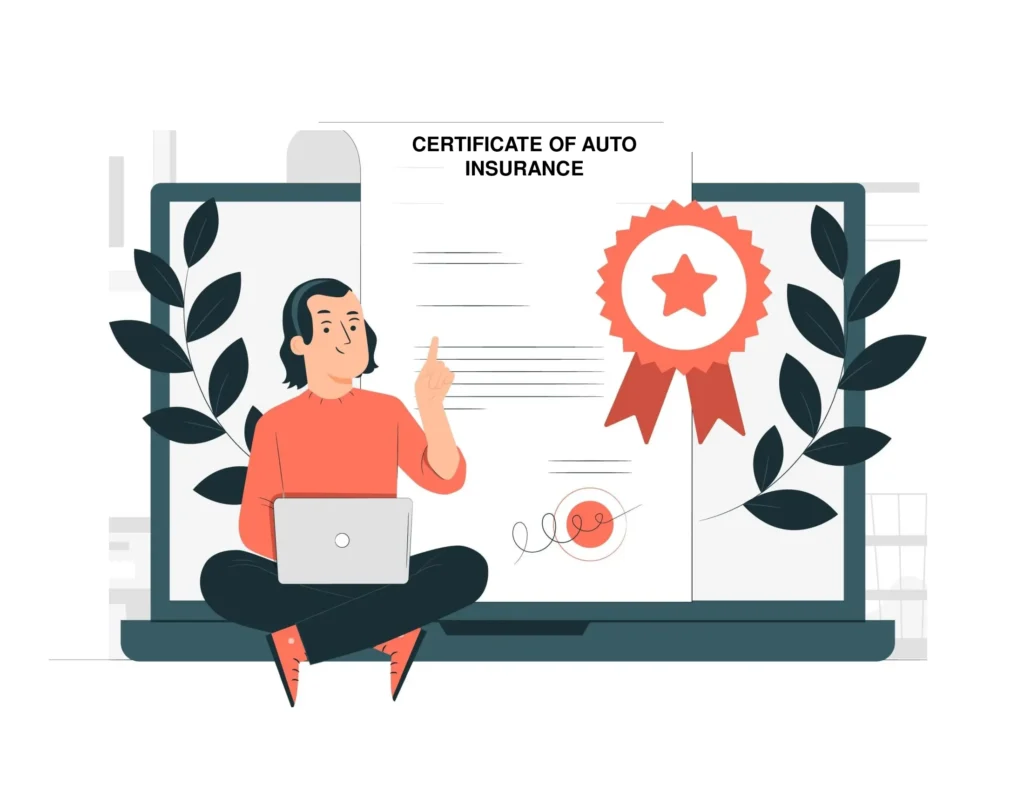
Owning a vehicle—whether it’s a car, motorcycle, or any other automobile—comes with major responsibilities. Accidents can happen anytime, and if you’re at fault, you could be held financially responsible for injuries or property damage. This is where Auto Insurance becomes essential.
But in many cases, just having an insurance policy isn’t enough. You may also need to provide a Certificate of Auto Insurance. This document serves as the official proof of insurance, confirming that your vehicle is insured and that you carry valid coverage.
This guide explains everything you need to know about Auto Insurance and Certificates of Insurance:
- What is Auto Insurance?
- Types of Auto Insurance Coverage
- Why Auto Insurance is Important
- What is a Certificate of Auto Insurance?
- Details Included in the Certificate
- When and Why It’s Required
- How to Get a Certificate of Auto Insurance
- Importance and Benefits of the Certificate
- FAQs
1. What is Auto Insurance?
Auto Insurance is a contract between you and your insurance company that protects you financially in case of accidents, theft, natural disasters, or legal liability.
In simple terms, if your car injures someone, damages another person’s property, or suffers significant damage itself, your auto insurance policy helps cover those costs.
2. Types of Auto Insurance Coverage
Auto insurance policies are designed to cover different types of risks:
- Liability Coverage – Covers bodily injury or property damage caused to others if you’re at fault.
- Collision Coverage – Pays for damages to your car if it’s involved in an accident.
- Comprehensive Coverage – Protects against theft, fire, vandalism, and natural disasters like floods, earthquakes, or storms.
- Medical Payments – Covers medical and hospital expenses after an accident.
- Uninsured/Underinsured Motorist Coverage – Protects you if another driver has little or no insurance.
3. Why is Auto Insurance Important?
- Legal Requirement – In most states, having valid auto insurance is mandatory.
- Financial Protection – Prevents you from facing huge out-of-pocket expenses after an accident.
- Vehicle Safety – Helps cover repair or replacement costs.
- Business Requirement – Many employers, clients, and companies demand proof of insurance before allowing vehicle use.
4. What is a Certificate of Auto Insurance?
A Certificate of Auto Insurance is an official document issued by your insurance company or agent. It proves that your vehicle is insured and summarizes the key details of your policy.
Think of it as:
- Auto Insurance Policy = Actual coverage
- Certificate of Auto Insurance = Proof that coverage exists
5. Information Included in the Certificate
Certificates are generally issued on the ACORD 25 Standard Form and contain details like:
- Policyholder’s name and address
- Insurance company details
- Vehicle information (Make, Model, VIN)
- Policy number
- Coverage limits
- Effective and expiration dates
- Liability coverage details
- Certificate holder’s name (the party requesting proof)
6. When and Why is a Certificate Required?
You may need to show your Auto Insurance Certificate in several situations:
- Vehicle purchase – Dealers require proof of insurance.
- Loan or lease financing – Banks and finance companies request it.
- Car rentals – Rental companies need insurance certificates.
- Employment or business use – Delivery, rideshare, or transport companies often ask for it.
- Police checks – Officers may request proof of coverage during inspections.
- Client requirements – Many contracts specifically require a Certificate of Insurance.
7. How to Get a Certificate of Auto Insurance
Obtaining the certificate is quick and simple:
- Contact your insurance company or agent.
- Submit a request, including details of the certificate holder (client, bank, or company).
- Receive the certificate – usually in PDF or printed format.
- Provide it to the requesting party via email, upload portal, or hard copy.
8. Importance and Benefits of the Certificate
- Legal Compliance – Ensures you meet state insurance laws.
- Business Opportunities – Needed for contracts, jobs, and commercial driving.
- Trust and Credibility – Builds confidence with clients and partners.
- Financial Security – Protects you and others in case of an accident.
- Professional Image – Shows you are responsible and prepared.
9. FAQs – Certificate of Auto Insurance
Q1. What’s the difference between an Insurance Card and a Certificate of Auto Insurance?
An insurance card is kept in your vehicle as personal proof, while a certificate is shared with third parties such as clients, banks, or employers.
Q2. Do I need a new certificate every year?
Yes. Certificates are tied to your policy term, so a new one is issued when your policy renews.
Q3. What if I don’t have a Certificate of Auto Insurance?
You may face delays with contracts, loans, or job approvals. In some cases, it could lead to legal issues.
Q4. Can the certificate be issued digitally?
Yes. Most insurers provide certificates in PDF form via email.
Q5. Who can request my Certificate of Auto Insurance?
- Clients
- Banks or finance companies
- Rental agencies
- Police officers
- Employers
